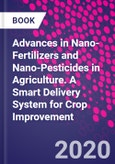Advances in Nano-fertilizers and Nano-pesticides in Agriculture: A Smart Delivery System for Crop Improvement explores the use of nanotechnology for the controlled delivery of pesticides, herbicides and fertilizers that improve the safety of products while also increasing the efficiency of food production and decreased environmental pollution. The development of nanodevices such as smart delivery systems to target specific sites, as well as nanocarriers for chemical controlled release are currently important aspects in novel agriculture and require a strong foundation of understanding, not only the technology, but also the resulting impacts.
Please Note: This is an On Demand product, delivery may take up to 11 working days after payment has been received.
Table of Contents
1. Nano-Biopesticides: Present Concept and Future Perspectives in integrated pest management 2. Recent advances in nano-encapsulation technologies for controlled release of biostimulants and �ntimicrobial agents 3. Nanofertilizers and Nanopesticides: Future of Plant Protection 4. Biopolymers based nanofertilizer application in abiotic stress (drought and salinity) control 5. Advances in nano-based delivery systems of micronutrients for a greener agriculture 6. Regulatory requirements for Nano-Fertilizers and Nano-Pesticides 7. Phytofabrication of Nanoparticles through plant as Nanofactories 8. Nanoparticles for improving and augmenting plant functions 9. Interaction, fate and risks associated with nanomaterials as fertilizers and pesticides 10. Nanotechnology: a potential approach for abiotic stress management 11. Marketing Strategy and Environmental Safety of Nano-Biopesticides 12. Nanofertilizers and Nanopesticides: Recent Trends, Future Prospects in Agriculture 13. Challenges and perspective for the application of nanomaterials as fertilizers 14. Biogenic synthesis of Nanoparticles and its biological applications 15. Smart Delivery Mechanisms of Nanofertilizers and Nanocides in Crop Biotechology 16. Unraveling the mechanism of nanoparticles for controlling plant pathogens and pests 17. Properties, synthesis, characterization and application of hydrogel and magnetic hydrogels: A concise review 18. Economic considerations and limitations of green synthesis vs chemical synthesis of nanomaterials 19. Insecticidal effect of chitosan reduced silver nanocrystals against filarial vector, Culex quinquefasciatus and Cotton Bollworm, Helicoverpa armigera 20. Exploring Nanomaterials with plant growth promoting microbes in Current Agricultural Scenario 21. Green Nanotechnology: A Promising Tool for Agriculture Disease Management 22. Molecular mechanism of nano-fertilizer in plant growth and development: a recent account 23. Commercial products available in world market and their economic viability








